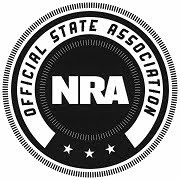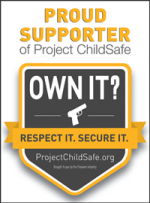S.B. 791 Concealed handgun permits; fee for processing. Makes the $10 fee that the clerk of court is now required to charge for processing a concealed handgun permit application or issuing a concealed handgun permit discretionary with the clerk. Reported and referred to Finance Committee
S.B. 809 Firearms; person to report loss or theft within 24 hours. Passed by indefinitely (defeated)
S.B. 832 Firearm transactions; voluntary background checks, clarification of provisions. Passed by indefinitely
S.B. 893 Firearm locks required for sale or transfer of handguns; warning against accessibility to children. Stricken at the request of the sponsor.
S.B. 953 Muzzleloader firearms; definition. Incorporates the Virginia criminal law definition of a muzzleloader into the current statutory definitions of muzzleloading pistol, muzzleloading rifle, and muzzleloading shotgun located in the Game and Inland Fisheries Title. Reported and referred to Finance Committee
S.B. 1049 Firearms; administration of machine gun registry, nonresident concealed handgun permits. Requires any person registered to possess a machine gun to notify the Department of State Police (the Department) of a change of address within 30 days of such change. The bill reduces the number of photographs that an applicant for a nonresident concealed handgun permit must submit from two to one. The bill requires the form provided by the Department for a dealer to obtain criminal history record information for a firearm purchase to include a question about whether the proposed purchaser has been the subject of a temporary detention order and subsequently agreed to voluntary admission to a state facility. Current law prohibits such persons from purchasing, possessing, or transporting a firearm and provides that other mental health disqualifications be disclosed on such form. The bill requires firearms dealers to comply with the federal minimum wait time of three days after contacting the system for a background check before releasing a firearm without an approval number; under existing state law, such firearm must be released after one business day without an approval number. The bill removes the option under state law for a dealer to complete a sale if notified that a response will not be available by the end of the dealer's next business day and removes the requirement that the Department notify the dealer of such delay. The bill removes the requirement that the dealer mail the criminal history record check consent form for a person who is not a resident of Virginia to the Department. Reported and referred to Finance Committee
S.B. 1112 Firearms; control of possession in chambers of local governing bodies.Allows a locality to adopt an ordinance that prohibits firearms, ammunition, or components or a combination thereof at any regular or special meeting of such local governing body, provided notice of such prohibition is publicly posted and the meeting room is owned or operated by the locality. Passed by indefinitely
S.B. 1185 Reporting lost or stolen firearms. Passed by indefinitely
S.B. 1194 Firearm transfers; criminal history record information checks; penalty. Requires a background check for any firearm transfer and requires the Department of State Police to establish a process for transferors to obtain such a check from licensed firearms dealers. A transferor who fails to obtain a required background check and sells the firearm to another person is guilty of a Class 1 misdemeanor. The bill exempts transfers between immediate family members, transfers that occur by operation of law, transfers by the executor or administrator of an estate or by the trustee of a testamentary trust, and temporary transfers that (i) occur within the continuous presence of the owner of the firearm; (ii) are necessary to prevent imminent death or serious bodily injury; (iii) occur at a shooting range, shooting gallery, or other area designed for the purpose of target shooting, for use during target practice, a firearms safety or training course or class, a shooting competition, or any similar lawful activity; or (iv) are for the purpose of and while the transferee is engaged in hunting, trapping, or target shooting. The bill removes the provision that makes background checks of prospective purchasers or transferees at firearms shows voluntary. Passed by indefinitely
S.B. 1266 Firearms; access by children; penalty. Provides that it is a Class 1 misdemeanor to knowingly authorize a child age four or younger to use or handle a firearm. Passed by indefinitely
S.B. 1267 Firearms; alcohol; penalties. Provides that it is a Class 1 misdemeanor for a person who is intoxicated or under the influence of illegal drugs to carry a loaded firearm on or about his person in a public place and that a person found guilty is ineligible to apply for a concealed handgun permit for a period of five years. Current law provides that such prohibition applies only to persons permitted to carry a concealed handgun. The bill also creates a Class 2 misdemeanor for a person who carries a loaded firearm on or about his person onto the premises of any restaurant or club licensed to sell and serve alcoholic beverages for on-premises consumption and consumes an alcoholic beverage while on the premises. Current law provides that such prohibition applies only to those persons carrying a concealed handgun on such premises. Passed by indefinetely
S.B. 1297 Concealed weapons; nonduty status active military personnel may carry. Provides that an active duty member of the Virginia National Guard, Armed Forces of the United States, or Armed Forces Reserves of the United States in a nonduty status may carry a concealed weapon wherever such member may travel in the Commonwealth. Incorporated into SB1362
S.B. 1299 Concealed handguns; protective orders. Authorizes any person 21 years of age or older who is not prohibited from purchasing, possessing, or transporting a firearm and is protected by an unexpired protective order to carry a concealed handgun for 45 days after the protective order was issued. The bill provides that if the person issued the protective order applies for a concealed handgun permit during such 45-day period, such person will be authorized to carry a concealed handgun for an additional 45 days and be given a copy of the certified application, which shall serve as a de facto concealed handgun permit. The bill requires such person to have the order or certified application and photo identification on his person when carrying a concealed handgun and to display them upon demand by a law-enforcement officer; failure to do so is punishable by a $25 civil penalty. Approved by committee and headed to full Senate
S.B. 1300 Victims of domestic violence, etc.; firearms safety or training course. Provides that the Department of Criminal Justice Services may distribute funds from the Virginia Sexual and Domestic Violence Victim Fund to reimburse an entity that offers a firearms safety or training course or class approved by the Department free of charge to victims of domestic violence, sexual abuse, stalking, and family abuse. The bill also requires that, upon the issuance of a protective order, the petitioner for the order be provided with a list of such approved courses or classes. Reported and referred to Finance Committee
S.B. 1362 Concealed weapons; nonduty status active military personnel may carry. Provides that an active duty member of the Virginia National Guard, Armed Forces of the United States, or Armed Forces Reserves of the United States in a nonduty status may carry a concealed weapon wherever such member may travel in the Commonwealth. Approved by committee and headed to full Senate
S.B. 1422 Law enforcement, local; fees for concealed handgun permits, courthouse and courtroom security. Eliminates (i) the fee, under current law up to $35, that a local law-enforcement agency is permitted to charge for conducting the background investigation for a concealed handgun permit and (ii) the requirement that the local law-enforcement agency forward to the State Police any amount assessed by the FBI for providing criminal history record information in the background investigation. The bill makes discretionary the current mandatory fee of up to $10 charged by the clerk for processing a concealed handgun permit application or issuing a permit. The bill increases from $10 to $20 the maximum amount, designated solely to fund courthouse and courtroom security, that a local governing body may assess against a convicted defendant as part of the costs in a criminal or traffic case in district or circuit court. Passed by indefinitely
S.B. 1439 Firearm transfers; penalties. Creates a Class 2 misdemeanor for a person who is not a licensed dealer to sell, rent, trade, or transfer a firearm to any other person who is not a licensed dealer. The bill also creates a Class 2 misdemeanor for a person who is not a licensed dealer to buy,rent, trade, or transfer a firearm from any other person who is not a licensed dealer. The bill exempts certain transfers, such as between immediate family members, by operation of law, at a firearms show with a voluntary background check, and when the transfer is temporary and is necessary to prevent imminent death or great bodily harm or occurs while in the continuous presence of the owner of the firearm. Passed by indefinitely
S.B. 1440 Concealed handgun; eligibility to carry openly within Commonwealth. (Constitutional Carry) Reported and referred to Finance Committee
S.B. 1443 Firearms; removal from persons posing substantial risk, penalties. Creates a procedure by which an attorney for the Commonwealth or law-enforcement officer may apply to a circuit court judge for a warrant to remove firearms from a person who poses a substantial risk of injury to himself or others. If firearms are seized pursuant to such warrant, the bill requires a court hearing within 14 days from execution of the warrant to determine whether the firearms should be returned or retained by law enforcement. Seized firearms may be retained by court order for up to 180 days or, with court approval, may be transferred to a third party chosen by the person from whom they were seized. Persons who have been served with a warrant to remove firearms until such warrant has been dissolved by a court or who are the subject of an order to retain firearms are disqualified from having a concealed handgun permit or purchasing a firearm from a licensed dealer and may not be employed by a licensed firearms dealer. The bill also provides that a person who transfers a firearm to a person he knows has been served with a warrant or who is the subject of an order is guilty of a Class 6 felony. Failed to report (defeated)
S.B. 1444 Restricted ammunition; use or attempted use in the commission of a felony, penalty. Removes the prohibition on use or attempted use of restricted firearm ammunition in any non-felony criminal offense. The bill expands the definition of restricted firearms ammunition to include "pinched tip" bullets and expands the exception to such definition to include certain ammunition with copper cores. The bill provides that if any ammunition has been approved by the federal Bureau of Alcohol, Tobacco, Firearms and Explosives for commercial sale, it is not restricted firearms ammunition. Reported and referred to Finance Committee
There are some remaining firearm related bills to be heard and legislators have until Friday afternoon to introduce legislation. The next meeting of the committee is Monday morning. If firearms bills are on the docket, VSSA will be there.








No comments:
Post a Comment